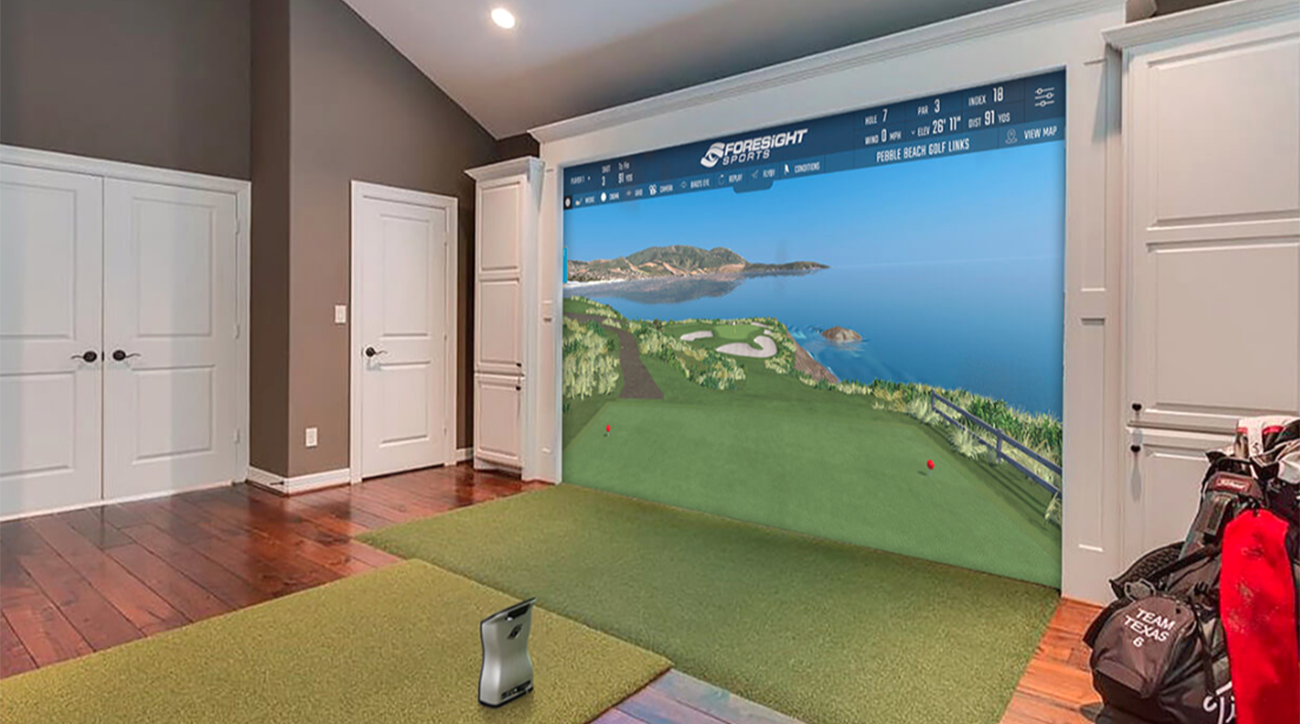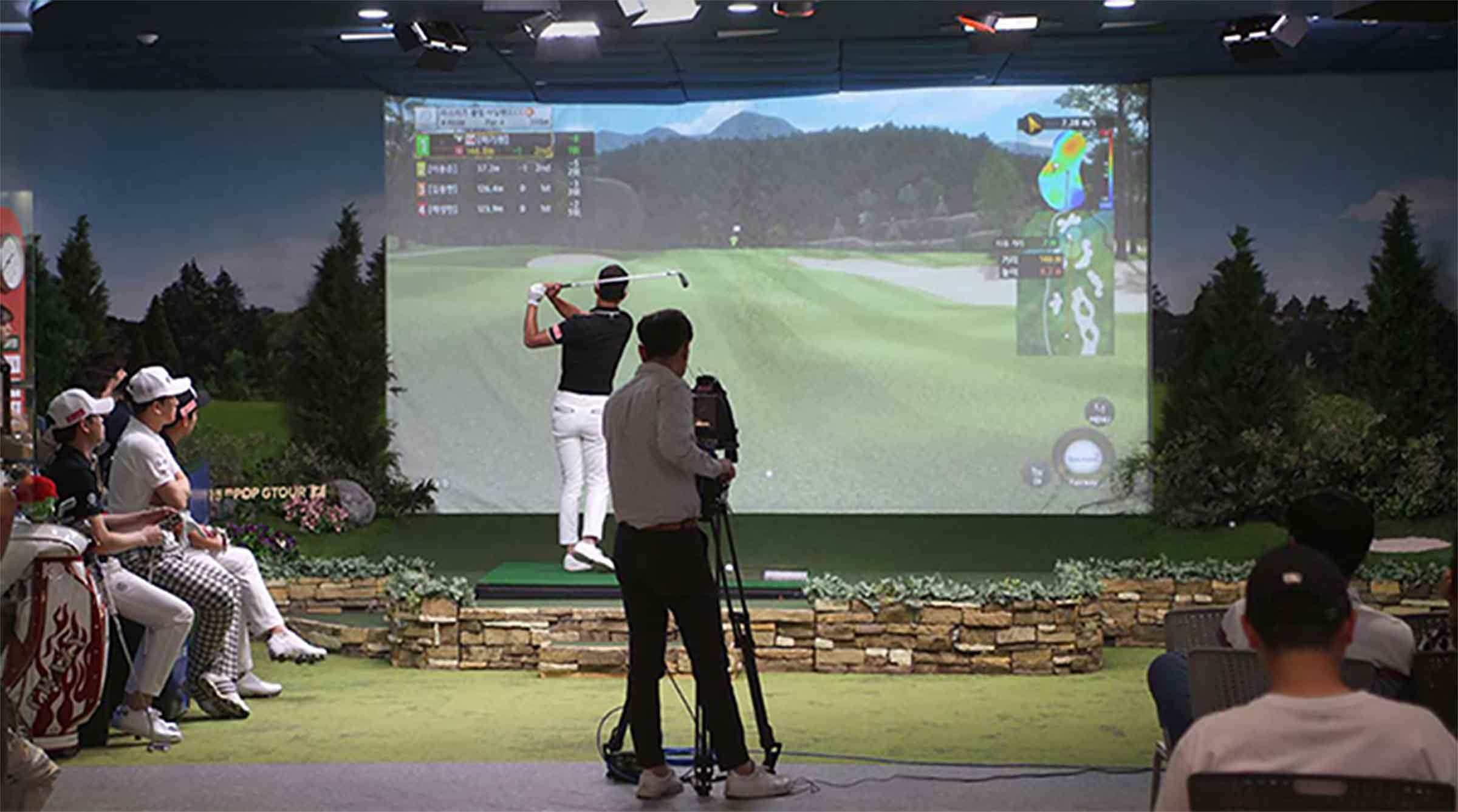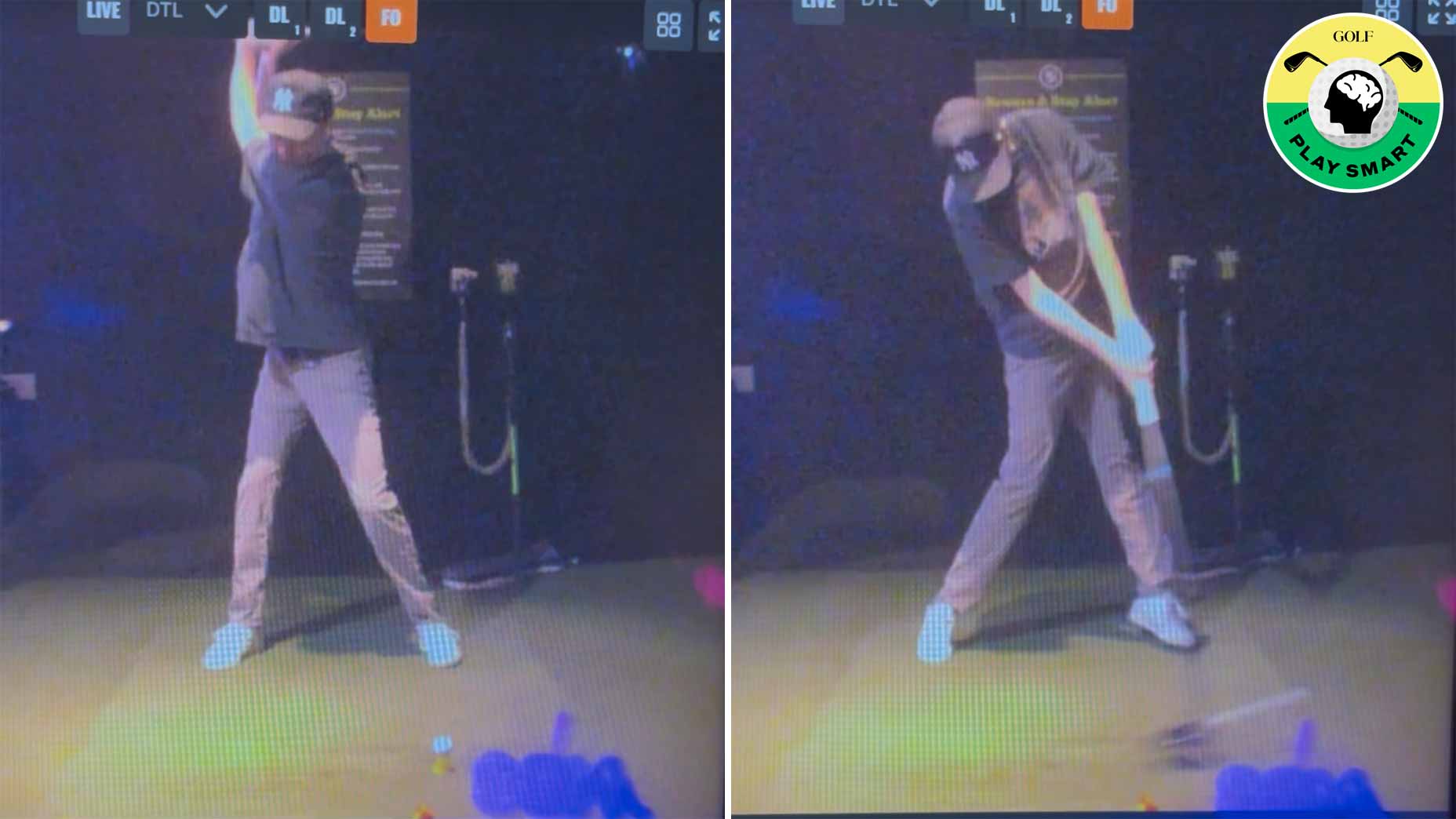We are living in a Golden Age of golf simulators, sophisticated setups that let you turn your room of choice into a high-tech practice range. Den. Office. Garage. Basement. You name it. (Even President Trump installed one in The White House.) But how to find the best golf simulator for your needs and budget?
“There’s a lot of flexibility because golf simulators are highly customizable,” says Jason Fierro of San Diego-based Full Swing simulators. “But whether you’re a scratch player or a 20-handicap, you’re probably going to use your simulator in the same way.”
Originally devised as a form of entertainment, golf simulators have evolved over the decades into refined tools for game improvement, their transformation pushed by technological advancements and the golf world’s growing demand for data. Though today’s simulators still allow for gaming (how about a virtual round on a digital rendition of your favorite layout?), their strongest selling point is their shot-tracking power. Launch angle. Spin rate. Club path. Carry. Name your favorite specs. They’re all tracked faithfully and furnished instantly.

In recent years, surging consumer interest has given rise to an increasingly competitive simulator market, and a dizzying assortment of customizable options. Choosing the simulator that’s right for you is apt to boil down largely to your budget (prices start as low as $3,000 for the barest bones of home simulators and range as high as $125,000.
Other factors to consider are ancillary features (how many virtual courses do you want in your archives? Are you interested in simulated versions of other sports?), as well as the simulator’s footprint and the space you have for it in your office or your home. To help narrow down your search, here’s a list of six leading players in the simulator market, along with a fly-by look at what they offer.
ABOUTGOLF
One of the company’s calling cards is the flexibility of its designs, which are available in range of sizes, ringed by a soft enclosure or a customized hardball. “At this point, we feel like we’ve got that data part pretty much dialed in,” says aboutGOLF CEO Randall Henry. “We’re really focused on continuing to fine-tune the user experience.”
Budget option: PGA Tour Classic and Widescreen, $50,000-$60,000
Like all of aboutGolf simulators, these entry level models come a three-camera tracking system and an archive of The distinction between them is the size of the screen.
Splurge option: Curve Screen Simulator, $125,000
Along with a curved screen for an immersive experience, aboutGolf’s blowout option includes such added features as video swing recording and aG Balance pro, an under-the-turf system that measures weight shift in your feet throughout your swing.

FORESIGHT SPORTS
Every simulator in the company’s collection gathers shot data within one-and-a-half feet of impact, which makes them customizable to almost any space. If you’ve got room to swing a club, you’ve got room for a Foresight.
Budget option: GC2 Smart Camera System Hitting Bay, $12,000-$25,000
Includes hitting bay and camera-based GC2 launch monitor, which is easy to move outside when the weather permits.
Splurge option: GCHawk Overhead Launch Monitor, $40,000-$45,000
The refined launch monitor in the GCHawk has four built-in cameras, each of which tracks ball flight different perspective. In this configuration, it is mounted overhead, allowing for greater flexibility in simulator design and game-play.

FULL SWING
Jordan Spieth, Brandt Snedeker and Jason Day rank among the Tour pros who’ve installed a Full Swing in their homes. A large part of the allure is the company’s dual tracking system, highlighted by infrared sensors that capture ball speed, launch angle and direction at the speed of light.
Budget option: Sports Series Simulator, from $19,000
Optimized for smaller spaces, with a dual camera tracking system, and a metal and fabric enclosure.
Splurge option: Pro Series Simulator, up to $125,000
One of the major upgrades here is the infrared tracking system, which provides a true representation of your ball’s actual flight, as opposed to a projection based on software calculations. The fully tricked-out option includes a database of 84 virtual courses, an interactive driving range and 12 other simulated sports, among other features.

HIGH DEFINITION GOLF
“I’ve played most of these courses in real life, and both the realism and accuracy are amazing.” That was ’92 Masters champion Fred Couples, referring to the visual courses in the HD Golf simulator that he recently acquired for his home. For everyday golfers, the three-camera tracking system might also be of interest, to say nothing of the video swing analysis function.
Budget option: Model 4:3 Flatscreen, $35,000
This standard version of the entry model comes with a 10-by-13-foot flatscreen, nylon turf and a computer-vision tracking system that measures launch angle, ball and club speed, club-face angle and swing path.
Splurge option: $65,000
Features such as virtual courses, practice facilities and gaming competitions are included in every HD Golf simulator. But the bigger your budget, the more of these bells and whistles you can afford to add.

GOLFZON
Recognized for its global reach, GolfZon has simulators in 48 countries and a software system that allows its users around the world to play games and competitions with one another. The company also sponsors GTour, the world’s first golf simulation tournament, with men’s and women’s divisions and total prize money of nearly $ 1 million.
Budget option: Vision Standard, from $35,000
A touch-screen kiosk, video swing replay and auto tee-up and ball retrieval system all come standard in GolfZon’s basic package, with a la carte extras such as a left-handed option and a moving swing plate, which replicates different turf lengths and lies.
Splurge option: Vision Premium, from $45,000
A refined flight tracking system and a larger screen, with a curved option, rank among the upgrades at this higher price point, which also includes an archive a virtual courses, a range of games and a hitting mat that mimics fairway, rough and bunkers.

TRACKMAN
A pioneering name in launch monitors, the company is also in the simulator game. Its reputation for reliable data is such that more than 800 Tour pros have purchased a TrackMan.
Budget option: TrackMan 4 Indoor only system, $18,995
Golf simulators have three main components: a launch monitor to gather data; virtual courses and practice grounds; and a physical enclosure, surrounding a projector and a screen. As a budget-friendly entry, the TrackMan 4 is available as stand-alone item; you can set up your own enclosure around it. The launch monitor comes with more than 30 virtual courses and video analysis, among other features.
Splurge option: TrackMan 4 Indoor with FlexCage I or FlexCage II, from $42,990
Along with the TrackMan 4 Indoor launch monitor, both offerings include an aluminum-and-elastic-fabric enclosure, a projector, a touchscreen monitor and durable, true-to-real-grass turf.

The product(s) featured in this article has been independently selected by GOLF.com’s editorial team. If you make a purchase using the links included, we may earn a small commission.






